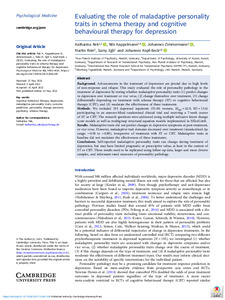| dc.date.accessioned | 2023-08-30T12:23:17Z | |
| dc.date.available | 2023-08-30T12:23:17Z | |
| dc.date.issued | 2022-05-10 | |
| dc.identifier | doi:10.17170/kobra-202308308709 | |
| dc.identifier.uri | http://hdl.handle.net/123456789/15041 | |
| dc.description.sponsorship | Gefördert im Rahmen des Projekts DEAL | |
| dc.language.iso | eng | |
| dc.rights | Namensnennung 4.0 International | * |
| dc.rights.uri | http://creativecommons.org/licenses/by/4.0/ | * |
| dc.subject | Cognitive behaviour therapy | eng |
| dc.subject | Depression | eng |
| dc.subject | Maladaptive personality traits | eng |
| dc.subject | Outcome prediction | eng |
| dc.subject | Personality change | eng |
| dc.subject | Precision psychiatry | eng |
| dc.subject | Schema therapy | eng |
| dc.subject.ddc | 150 | |
| dc.title | Evaluating the role of maladaptive personality traits in schema therapy and cognitive behavioural therapy for depression | eng |
| dc.type | Aufsatz | |
| dcterms.abstract | Background: Advancements in the treatment of depression are pivotal due to high levels of non-response and relapse. This study evaluated the role of personality pathology in the treatment of depression by testing whether maladaptive personality traits (1) predict changes in depression over treatment or vice versa, (2) change themselves over treatment, (3) change differentially depending on treatment with schema therapy (ST) or cognitive behavioural therapy (CBT), and (4) moderate the effectiveness of these treatments.
Methods: We included 193 depressed inpatients (53.4% women, Mage = 42.9, SD = 13.4) participating in an assessor-blind randomized clinical trial and receiving a 7-week course of ST or CBT. The research questions were addressed using multiple indicator latent change score models as well as multigroup structural equation models implemented in EffectLiteR.
Results: Maladaptive traits did not predict changes in depressive symptoms at post-treatment, or vice versa. However, maladaptive trait domains decreased over treatment (standardized Δμ range: −0.38 to −0.89), irrespective of treatment with ST or CBT. Maladaptive traits at baseline did not moderate the effectiveness of these treatments.
Conclusions: Self-reported maladaptive personality traits can change during treatment of depression, but may have limited prognostic or prescriptive value, at least in the context of ST or CBT. These results need to be replicated using follow-up data, larger and more diverse samples, and informant-rated measures of personality pathology. | eng |
| dcterms.accessRights | open access | |
| dcterms.creator | Rek, Katharina | |
| dcterms.creator | Kappelmann, Nils | |
| dcterms.creator | Zimmermann, Johannes | |
| dcterms.creator | Rein, Martin | |
| dcterms.creator | Egli, Samy | |
| dcterms.creator | Kopf-Beck, Johannes | |
| dcterms.extent | 4405-4414 | |
| dc.relation.doi | doi:10.1017/S0033291722001209 | |
| dc.subject.swd | Depression | ger |
| dc.subject.swd | Kognitive Verhaltenstherapie | ger |
| dc.subject.swd | Persönlichkeitsveränderung | ger |
| dc.subject.swd | Schematherapie | ger |
| dc.type.version | publishedVersion | |
| dcterms.source.identifier | eissn:1469-8978 | |
| dcterms.source.issue | Issue 10 | |
| dcterms.source.journal | Psychological Medicine | eng |
| dcterms.source.volume | Volume 53 | |
| kup.iskup | false | |


